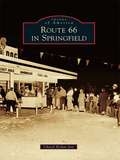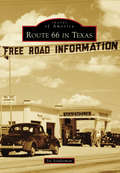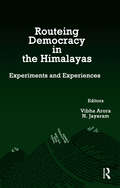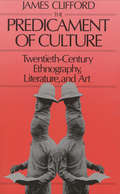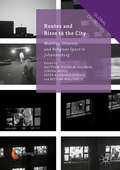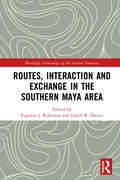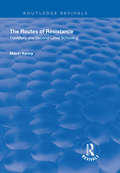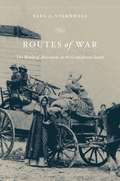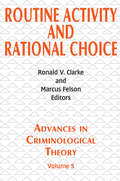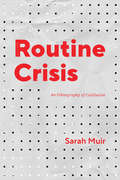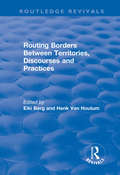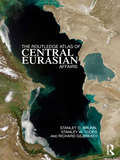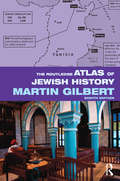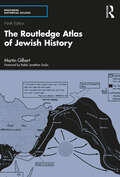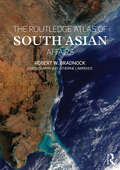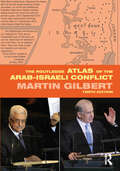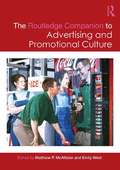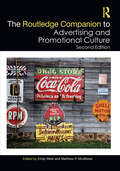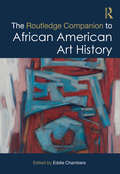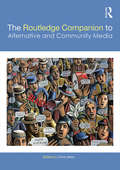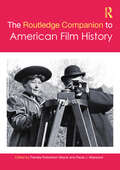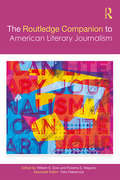- Table View
- List View
Route 66 in Springfield
by Cheryl JettFrom 1926 through 1977, Route 66 carried millions of travelers from the shores of Lake Michigan to the Pacific Coast. Americans fell in love with the automobile and made a family tradition of the road trip. On its three different alignments through the capital city of Springfield, Route 66 took motorists around the Illinois State Fairgrounds, past the state capitol, and through Abraham Lincoln's neighborhood. Mom-and-pop motels, gas stations, and eateries opened along the highway and became familiar landmarks to travelers in the "Land of Lincoln." In Springfield, the "horseshoe" and the "cozy dog" became popular local foods, and one of the first drive-up window restaurants opened. A man spent 40 years on Route 66 operating his gas station before transforming it into an internationally known museum. Meet the proprietors of these businesses, witness the growth of the highway, and enjoy a generous dose of nostalgia.
Route 66 in Texas
by Joe SondermanRoute 66 stretches across 178 miles and through seven counties in the Texas Panhandle. To a traveler on Interstate 40, the road may seem like an endless expanse, with the horizon interrupted only by the occasional grain elevator. But there is history, scenery, and adventure waiting on Route 66, which follows the trail of the Native Americans, conquistadors, cattle and oil barons, cowboys, and Dust Bowl refugees. With such sites as the blazing neon sign at Shamrock's U-Drop Inn and the quiet ruins of Glenrio, Route 66 in Texas is still "The Main Street of America." The traveler who leaves the franchised blandness of the interstate will see motels with Western and Native American imagery, good old-fashioned tourist traps, some bizarre sculptures (such as cars stuck in the ground at Cadillac Ranch), and beautiful Art Deco structures. These images and stories tell of mom-and-pop establishments that still thrive today and those that are crumbling in the swirling dust and tumbleweeds of the notorious Jericho Gap.
Routeing Democracy in the Himalayas: Experiments and Experiences
by Vibha Arora; N. JayaramHistorically treated as an amorphous borderland and marginal to the understanding of democratic politics and governance in South Asia, Southeast Asia and northern Asia, the Himalayan region, in the last 50 years, has become an ‘active political laboratory’ for experiments in democratic structures and institutions. In turn, it has witnessed the evolution of myriad political ideologies, movements and administrative strategies to accommodate and pacify heterogeneous ethnic-national identities.Routeing Democracy in the Himalayas highlights how, through an ongoing process of democratisation, the Western liberal ideologies of democracy and decentralisation have interacted with varied indigenous politico-cultural ideas and institutions of an ethnic-nationally diverse population. It also reviews how formal democracy, regular elections, local self-governing structures, protection of the rights of minorities and indigenes, freedom of expression, development of mass media and formation of ethnic homelands — all have furthered participatory democracy, empowered the traditionally marginalised groups and ensured sustainable development to varying degrees. The book provides ethnographic and historical vistas of democracy under formation, at work, being contested and even being undermined, showing how democratisation thematically stitches the independent Himalayan nations and the Indian Himalayan states into a distinctive regional political mosaic.Combining new perspectives from comparative sociology, political anthropology and development studies, the volume will be useful for policy makers, as well as specialists, researchers and students in sociology, anthropology, area studies, development studies, and Tibet and Himalayan studies.
Routes: Travel and Translation in the Late Twentieth Century
by James CliffordWhen culture makes itself at home in motion, where does an anthropologist stand? In a follow-up to The Predicament of Culture, one of the defining books for anthropology in the last decade, James Clifford takes the proper measure: a moving picture of a world that doesn’t stand still, that reveals itself en route, in the airport lounge and the parking lot as much as in the marketplace and the museum. In this collage of essays, meditations, poems, and travel reports, Clifford takes travel and its difficult companion, translation, as openings into a complex modernity. He contemplates a world ever more connected yet not homogeneous, a global history proceeding from the fraught legacies of exploration, colonization, capitalist expansion, immigration, labor mobility, and tourism. Ranging from Highland New Guinea to northern California, from Vancouver to London, he probes current approaches to the interpretation and display of non-Western arts and cultures. Wherever people and things cross paths and where institutional forces work to discipline unruly encounters, Clifford’s concern is with struggles to displace stereotypes, to recognize divergent histories, to sustain “postcolonial” and “tribal” identities in contexts of domination and globalization. Travel, diaspora, border crossing, self-location, the making of homes away from home: these are transcultural predicaments for the late twentieth century. The map that might account for them, the history of an entangled modernity, emerges here as an unfinished series of paths and negotiations, leading in many directions while returning again and again to the struggles and arts of cultural encounter, the impossible, inescapable tasks of translation.
Routes and Rites to the City
by Matthew Wilhelm-Solomon Lorena Núñez Peter Kankonde Bukasa Bettina MalcomessThis thought-provoking book is an exploration of the ways religion and diverse forms of mobility have shaped post-apartheid Johannesburg, South Africa. It analyses transnational and local migration in contemporary and historical perspective, along with movements of commodities, ideas, sounds and colours within the city. It re-theorizes urban 'super-diversity' as a plurality of religious, ethnic, national and racial groups but also as the diverse processes through which religion produces urban space. The authors argue that while religion facilitates movement, belonging and aspiration in the city, it is complicit in establishing new forms of enclosure, moral order and spatial and gendered control. Multi-authored and interdisciplinary, this edited collection deals with a wide variety of sites and religions, including Christianity, Islam, Hinduism and Judaism. Its original reading of post-apartheid Johannesburg advances global debates around religion, urbanization, migration and diversity, and will appeal to students and scholars working in these fields.
Routes, Interaction and Exchange in the Southern Maya Area (Routledge Archaeology of the Ancient Americas)
by Eugenia J. Robinson Gavin R. DaviesThis book explores routes of interaction and exchange in the Southern Maya Area, a zone that had both short- and long-distance trade and whose natural resources were exploited by merchants and rulers, colonists and entrepreneurs during Olmec, Teotihuacan, Maya, Aztec, colonial and modern times. The book presents the research of both archaeologists and art historians to identify routes of interconnection, to demonstrate the strategic importance of settlements and ritual locations, and to assess the significance of modes and mediums of exchange. The contributors employ innovative approaches, making use of state-of-the art technologies to reproduce and analyze the archaeological landscape (e.g. LiDAR, GIS, and least-cost path analysis) and to source and characterize archaeological materials (e.g. neutron activation analysis (NAA), X-ray fluorescence analysis [XRF] and strontium analysis). The book combines these innovative approaches with earlier data sources and past analyses to develop a new, synthetic analysis of interaction. Routes, Interaction and Exchange in the Southern Maya Area will appeal to professional academics, students, and interested lay readers from a broad range of social science fields including anthropology, archaeology, geography, economics, history, and art history and is appropriate for undergraduate and graduate courses in Mesoamerican archaeology.
Routes, Interaction and Exchange in the Southern Maya Area (Routledge Archaeology of the Ancient Americas)
by Eugenia J. Robinson Gavin R. DaviesThis book explores routes of interaction and exchange in the Southern Maya Area, a zone that had both short- and long-distance trade and whose natural resources were exploited by merchants and rulers, colonists and entrepreneurs during Olmec, Teotihuacan, Maya, Aztec, colonial and modern times.The book presents the research of both archaeologists and art historians to identify routes of interconnection, to demonstrate the strategic importance of settlements and ritual locations, and to assess the significance of modes and mediums of exchange. The contributors employ innovative approaches, making use of state-of-the art technologies to reproduce and analyze the archaeological landscape (e.g. LiDAR, GIS, and least-cost path analysis) and to source and characterize archaeological materials (e.g. neutron activation analysis (NAA), X-ray fluorescence analysis [XRF] and strontium analysis). The book combines these innovative approaches with earlier data sources and past analyses to develop a new, synthetic analysis of interaction.Routes, Interaction and Exchange in the Southern Maya Area will appeal to professional academics, students, and interested lay readers from a broad range of social science fields including anthropology, archaeology, geography, economics, history, and art history and is appropriate for undergraduate and graduate courses in Mesoamerican archaeology.
The Routes of Resistance: Travellers and Second-level Schooling (Routledge Revivals)
by Máirín KennyFirst published in 1997, this study is an attempt to read and critique answers to that question, answers offered in policy and provision, and answers to those answers, in talk and texts, and in classroom performances, an often fraught ‘conversation’ which goes on in spirals.
Routes of War
by Yael A. SternhellThe Civil War thrust millions of men and women-rich and poor, soldiers and civilians, enslaved and free-onto the roads of the South. During four years of war, Southerners lived on the move. In the hands of Yael A. Sternhell, movement becomes a radically new means to perceive the full trajectory of the Confederacys rise, struggle, and ultimate defeat. By focusing not only on the battlefield and the home front but also on the roads and woods that connected the two, this pioneering book investigates the many roles of bodies in motion. We watch battalions of young men as they march to the front, galvanizing small towns along the way, creating the Confederate nation in the process. We follow deserters straggling home and refugees fleeing enemy occupation, both hoping to escape the burdens of war. And in a landscape turned upside down, we see slaves running toward freedom, whether hundreds of miles away or just beyond the plantations gate. Based on a vast array of documents, from slave testimonies to the papers of Confederate bureaucrats to the private letters of travelers from all walks of life, Sternhell unearths the hidden connections between physical movements and their symbolic meanings, individual bodies and entire armies, the reinvention of a social order and the remaking of private lives. Movement, as means of liberation and as vehicle of subjugation, lay at the heart of the human condition in the wartime South.
Routine Activity and Rational Choice: Volume 5 (Advances in Criminological Theory)
by Ronald V. Clarke Marcus FelsonTwo new criminological approaches are defined and applied to categories of crime in Routine Activity and Rational Choice, now available in paperback. Routine activity analyzes the criminal event, and avoids motivations and psychology as topics for discussion, whereas rational choice approaches crime as purposive behavior designed to meet the offender's commonplace needs, such as money, status, sex, and excitement. These conceptual models are both employed to analyze such crimes as drunk driving, gun use, kidnapping, and political violence. This volume discusses the relationship of these theories to more traditional approaches to crime studies.The Advances in Criminological Theory series encourages theory construction and validation in the articles and themes selected for publication. It also furthers the free exchange of ideas, propositions, and postulates. Following publication of the first volume, Michael J. Lynch of Florida State University asserted that "Advances in Criminological Theory is to be applauded as an attempt to revive criminological theory by providing an accessible outlet." Contributions to this volume include: Pierre Tremblay, "Searching for Suitable Co-offenders"; Raymond Paternoster and Sally Simpson, "A Rational Choice Theory of Corporate Crime"; Richard B. Felson, "Predatory and Dispute-related Violence"; Gordon Trasler, "Conscience, Opportunity, Rational Choice, and Crime"; Ezzat A. Fattah, "The Rational Choice/Opportunity Perspectives as a Vehicle for Integrating Criminological and Victimological Theories"; Patricia L. Brantingham and Paul J. Brantingham, "Environment, Routine, and Situation"; Maurice Cusson, "A Strategic Analysis of Crime"; Richard W. Harding, "Gun Use in Crime, Rational Choice, and Social Learning Theory."
Routine Crisis: An Ethnography of Disillusion (Chicago Studies in Practices of Meaning)
by Sarah MuirArgentina, once heralded as the future of capitalist progress, has a long history of economic volatility. In 2001–2002, a financial crisis led to its worst economic collapse, precipitating a dramatic currency devaluation, the largest sovereign default in world history, and the flight of foreign capital. Protests and street blockades punctuated a moment of profound political uncertainty, epitomized by the rapid succession of five presidents in four months. Since then, Argentina has fought economic fires on every front, from inflation to the cost of utilities and depressed industrial output. When things clearly aren't working, when the constant churning of booms and busts makes life almost unlivable, how does our deeply compromised order come to seem so inescapable? How does critique come to seem so blunt, even as crisis after crisis appears on the horizon? What are the lived effects of that sense of inescapability? Anthropologist Sarah Muir offers a cogent meditation on the limits of critique at this historical moment, drawing on deep experience in Argentina but reflecting on a truly global condition. If we feel things are being upended in a manner that is ongoing, tumultuous, and harmful, what would we need to do—and what would we need to give up—to usher in a revitalized critique for today's world? Routine Crisis is an original provocation and a challenge to think beyond the limits of exhaustion and reimagine a form of criticism for the twenty-first century.
Routine Crisis: An Ethnography of Disillusion (Chicago Studies in Practices of Meaning)
by Sarah MuirArgentina, once heralded as the future of capitalist progress, has a long history of economic volatility. In 2001–2002, a financial crisis led to its worst economic collapse, precipitating a dramatic currency devaluation, the largest sovereign default in world history, and the flight of foreign capital. Protests and street blockades punctuated a moment of profound political uncertainty, epitomized by the rapid succession of five presidents in four months. Since then, Argentina has fought economic fires on every front, from inflation to the cost of utilities and depressed industrial output. When things clearly aren't working, when the constant churning of booms and busts makes life almost unlivable, how does our deeply compromised order come to seem so inescapable? How does critique come to seem so blunt, even as crisis after crisis appears on the horizon? What are the lived effects of that sense of inescapability? Anthropologist Sarah Muir offers a cogent meditation on the limits of critique at this historical moment, drawing on deep experience in Argentina but reflecting on a truly global condition. If we feel things are being upended in a manner that is ongoing, tumultuous, and harmful, what would we need to do—and what would we need to give up—to usher in a revitalized critique for today's world? Routine Crisis is an original provocation and a challenge to think beyond the limits of exhaustion and reimagine a form of criticism for the twenty-first century.
Routine Crisis: An Ethnography of Disillusion (Chicago Studies in Practices of Meaning)
by Sarah MuirArgentina, once heralded as the future of capitalist progress, has a long history of economic volatility. In 2001–2002, a financial crisis led to its worst economic collapse, precipitating a dramatic currency devaluation, the largest sovereign default in world history, and the flight of foreign capital. Protests and street blockades punctuated a moment of profound political uncertainty, epitomized by the rapid succession of five presidents in four months. Since then, Argentina has fought economic fires on every front, from inflation to the cost of utilities and depressed industrial output. When things clearly aren't working, when the constant churning of booms and busts makes life almost unlivable, how does our deeply compromised order come to seem so inescapable? How does critique come to seem so blunt, even as crisis after crisis appears on the horizon? What are the lived effects of that sense of inescapability? Anthropologist Sarah Muir offers a cogent meditation on the limits of critique at this historical moment, drawing on deep experience in Argentina but reflecting on a truly global condition. If we feel things are being upended in a manner that is ongoing, tumultuous, and harmful, what would we need to do—and what would we need to give up—to usher in a revitalized critique for today's world? Routine Crisis is an original provocation and a challenge to think beyond the limits of exhaustion and reimagine a form of criticism for the twenty-first century.
Routing Borders Between Territories, Discourses and Practices (Critical Security Ser.)
by Eiki Berg Henk Van HoutumThis title was first published in 2003. This multi-disciplinary reading focuses on the latent meaningful and contextual strategies that are often implied and included in bordering processes. It demonstrates that the border as a concept is not so much an object, but rather an ongoing process. The book also consciously and provocatively balances the modernist trap of universalism, exclusive ordering and state-centrism and the postmodernist trap of moral nihilism. Leading specialists in their fields provide illustrative case studies from Europe and Asia, making a major contribution to border studies.
The Routledge Atlas of Central Eurasian Affairs
by Stanley D. Brunn Stanley W. Toops Richard GilbreathProviding concisely written entries on the most important current issues in Central Asia and Eurasia, this atlas offers relevant background information on the region’s place in the contemporary political and economic world. Features include: Profiles of the constituent countries of Central Asia, namely Kazakhstan, Kyrgyzstan, Tajikistan, Turkmenistan, and Uzbekistan Profiles of Mongolia, western China, Tibet, and the three Caucasus states of Armenia, Azerbaijan, and Georgia Timely and significant original maps and data for each entry A comprehensive glossary, places index and subject index of major concepts, terms and regional issues Bibliography and useful websites section Designed for use in teaching undergraduate and graduate classes and seminars in geography, history, economics, anthropology, international relations, political science and the environment as well as regional courses on the Former Soviet Union, Central Asia, and Eurasia, this atlas is also a comprehensive reference source for libraries and scholars interested in these fields.
The Routledge Atlas of Jewish History (Routledge Historical Atlases)
by Martin Gilbert'An unusual and compelling insight into Jewish history... sheer detail and breadth of scale' BBC History Magazine This newly revised and updated edition of Martin Gilbert’s Atlas of Jewish History spans over four thousand years of history in 154 maps, presenting a vivid picture of a fascinating people and the trials and tribulations which have haunted their story. The themes covered include: Prejudice and Violence- from the destruction of Jewish independence between 722 and 586 BC to the flight from German persecution in the 1930s. Also covers the incidence of anti-semitic attacks in the Americas and Europe. Migrations and Movements- from the entry into the promised land to Jewish migration in the twenty- first century, including new maps on recent emigration to Israel from Europe and worldwide. Society, Trade and Culture- from Jewish trade routes between 800 and 900 to the situation of world Jewry in the opening years of the twenty- first century. Politics, Government and War- from the Court Jews of the fifteenth century to the founding and growth of the modern State of Israel. This new edition is also updated to include maps showing Jewish museums in the United States and Canada, and Europe, as well as American conservation efforts abroad. Other topics covered in this revised edition include Jewish educational outreach projects in various parts of the world, and Jews living under Muslim rule. Forty years on from its first publication, this book is still an indispensible guide to Jewish history.
The Routledge Atlas of Jewish History (Routledge Historical Atlases)
by Martin GilbertThis 9th edition of Martin Gilbert’s Atlas of Jewish History spans over four thousand years of history in 196 maps, starting with the worldwide migration of the Jews from ancient Mesopotamia and coming up into the first decades of the twenty-first century. It presents a vivid picture of a fascinating people and the trials and tribulations which have haunted the Jewish story, as well as Jewish achievements. The themes covered include: Prejudice and Violence – from the destruction of Jewish independence between 722 and 586 BC to the flight from German persecution in the 1930s. Also covers the incidence of anti-Semitic attacks in the Americas and Europe. Migrations and Movements – from ancient dispersals from the promised land, to new maps on the ingathering of exiles from Arab and Muslim lands from 1948, and from the break-up of the Soviet Union in 1992. Society, Trade and Culture – from Jewish trade routes between 800 and 900, the geography of the Jews of China, of India, to communal life in the ghettoes and the situation of world Jewry in the opening years of the twenty-first century. Politics, Government and War – from the Court Jews of the fifteenth century to the founding and growth of the modern State of Israel. This new edition now includes an additional 39 of Martin Gilbert’s maps, across the whole range of Jewish history, originally published across a range of publications, now gathered in this one volume for the first time. Over 50 years on from its first publication, this book is still an indispensable guide to Jewish history.
The Routledge Atlas of South Asian Affairs
by Robert W. BradnockSouth Asia has developed from a group of newly independent post-Colonial states of at most secondary importance to the wider world to its current position as a region of central strategic importance to both global economic development and world peace and stability. This Atlas highlights the global significance of South Asia in relation to economic, geopolitical and strategic interests. It provides a coherent descriptive and analytical account of the key elements of the complex societies that make up the region and its component countries. Illustrated with more than 100 original maps and offering concise entries on key issues, the book is structured thematically in these sections: Global Context Geographical Environments Historical Evolution of South Asia Key Issues in modern South Asia Economy and Security Designed for use in teaching undergraduate and graduate classes and seminars in geography, history, economics, anthropology, international relations, political science and the environment as well as regional courses on the South Asia, this book is also a comprehensive reference source for libraries and decision makers focusing on South Asia.
The Routledge Atlas of the Arab-Israeli Conflict: The Complete History Of The Struggle And The Efforts To Resolve It (Routledge Historical Atlases)
by Martin GilbertThe Routledge Atlas of the Arab-Israeli Conflict traces not only the tangled and bitter history of the Arab-Jewish struggle from the early twentieth century to the present, including the death of Yasser Arafat and recent proposals for compromise and co-operation, it also illustrates the current moves towards finding peace, and the efforts to bring the horrors of the fighting to an end through negotiation and agreed boundaries. In 227 maps, the complete history of the conflict is revealed, including: The Prelude and Background to the Conflict - from the presence of Jews in Palestine before the Arab conquest to the attitude of Britain to the Arabs and Jews since 1915 The Jewish National Home - from the early Jewish settlement and the Zionist plan for Palestine in 1919 to the involvement of the Arab world from 1945 to the present day The Intensification of the Conflict - from the Arab response to the United Nations partition plan of November 1947 to the declaration of Israeli independence in May 1948 The State of Israel - from the Israeli War of Independence and the Suez and Six Day Wars to the October War (the Yom Kippur War), the first and second intifadas, the suicide-bomb campaign, the Israel-Hezbollah War of 2006, Operation Cast lead against the Gaza Strip in 2009, the Gaza Flotilla of 2012 and Nakba Day 2011 The Moves to find Peace - from the first and second Camp David talks and the death of Arafat, to the continuing search for peace, including the Annapolis Conference, 2007, the work of the Quartet Emissary, Tony Blair 2007-2011, and the ongoing Palestinian search for statehood.
The Routledge Companion to Advertising and Promotional Culture (Routledge Media and Cultural Studies Companions)
by Matthew P. McAllister Emily WestThe Routledge Companion to Advertising and Promotional Culture provides an essential guide to the key issues, methodologies, concepts, debates, and policies that shape our everyday relationship with advertising. The book contains eight sections: Historical Perspectives considers the historical roots and their relationship to recent changes of contemporary advertising and promotional practice. Political Economy examines how market forces, corporate ownership, and government policies shape the advertising and media promotion environment. Globalization presents work on advertising and marketing as a global, intercultural, and transnational practice. Audiences as Labor, Consumers, Interpreters, Fans introduces how people construct promotional meaning and are constructed as consumers, markets, and labor by advertising forces. Identities analyzes the ways that advertising constructs images and definitions of groups -- such as gender, race and the child -- through industry labor practices, marketing, as well as through representation in advertising texts. Social Institutions looks at the pervasiveness of advertising strategies in different social domains, including politics, music, housing, and education. Everyday Life highlights how a promotional ethos and advertising initiatives pervade self image, values, and relationships. The Environment interrogates advertising’s relationship to environmental issues, the promotional efforts of corporations to construct green images, and mass consumption’s relationship to material waste. With chapters written by leading international scholars working at the intersections of media studies and advertising studies, this book is a go-to source for those looking to understand the ways advertising has shaped consumer culture, in the past and present.
The Routledge Companion to Advertising and Promotional Culture (Routledge Media and Cultural Studies Companions)
by Emily West Matthew P. McAllisterThis comprehensive second edition provides an updated essential guide to the key issues, methodologies, concepts, debates, and policies that shape our everyday relationship with advertising. This updated edition takes a critical look at advertising and promotion during the explosion of digital and social media, as well as with significant social and cultural shifts, including the COVID-19 pandemic, the rise of the Black Lives Matter movement, the destabilization of democracies and rise of authoritarianism around the world, and intensification of the climate crisis. The book offers global perspectives on advertising and promotion with attention to issues of diversity and difference. It contains eight sections: Historical Perspectives on Advertising and Promotion; Promotional Industries; Advertising Audiences; Advertising Identities; Advertising and/in Crisis; Promotion and Politics; Promotionalism and Its Expansions; and Advertising, Promotion, and the Environment. With chapters written by leading international scholars working at the intersections of media and advertising studies, this book is a go-to source for scholars and students in communication, media studies, and advertising and marketing looking to understand the ways advertising has shaped consumer culture, in the past and present.
The Routledge Companion to African American Art History (Routledge Art History and Visual Studies Companions)
by Eddie ChambersThis Companion authoritatively points to the main areas of enquiry within the subject of African American art history. The first section examines how African American art has been constructed over the course of a century of published scholarship. The second section studies how African American art is and has been taught and researched in academia. The third part focuses on how African American art has been reflected in art galleries and museums. The final section opens up understandings of what we mean when we speak of African American art. This book will be of interest to graduate students, researchers, and professors and may be used in American art, African American art, visual culture, and culture classes.
The Routledge Companion to Alternative and Community Media (Routledge Media and Cultural Studies Companions)
by Chris AttonThe Routledge Companion to Alternative and Community Media provides an authoritative and comprehensive examination of the diverse forms, practices and philosophies of alternative and community media across the world. The volume offers a multiplicity of perspectives to examine the reasons why alternative and community media arise, how they develop in particular ways and in particular places, and how they can enrich our understanding of the broader media landscape and its place in society. The 50 chapters present a range of theoretical and methodological positions, and arguments to demonstrate the dynamic, challenging and innovative thinking around the subject; locating media theory and practice within the broader concerns of democracy, citizenship, social exclusion, race, class and gender. In addition to research from the UK, the US, Canada, Europe and Australia, the Companion also includes studies from Colombia, Haiti, India, South Korea and Zimbabwe, enabling international comparisons to be made and also allowing for the problematisation of traditional - often Western - approaches to media studies. By considering media practices across a range of cultures and communities, this collection is an ideal companion to the key issues and debates within alternative and community media.
The Routledge Companion to American Film History (Routledge Media and Cultural Studies Companions)
by Paula J. MassoodPresenting new and diverse scholarship, this collection brings together original essays that explore American film history from a fresh perspective.Comprising an introduction and 34 chapters written by leading scholars from around the globe, and edited by Pamela Robertson Wojcik and Paula J. Massood, this collection offers discussions of the American film industry from previously unexplored vantage points. Rather than follow a chronological format, as with most film histories, this Companion offers a multiplicity of approaches to historiography and is arranged according to often underdeveloped or overlooked areas in American film, including topics such as alternate archives, hidden labor, histories of style, racialized technologies, cinema’s material cultures, spectators and fans, transnational film production, intermedial histories, history in and about films, and the historical afterlives of cinema.An exciting collection for serious film studies students and scholars interested in new perspectives and fresh approaches to thinking about and doing American film history.
The Routledge Companion to American Literary Journalism (Routledge Media and Cultural Studies Companions)
by William E. Dow Roberta MaguireTaking a thematic approach, this new companion provides an interdisciplinary, cross-cultural, and international study of American literary journalism.From the work of Frederick Douglass and Walt Whitman to that of Joan Didion and Dorothy Parker, literary journalism is a genre that both reveals and shapes American history and identity. This volume not only calls attention to literary journalism as a distinctive genre but also provides a critical foundation for future scholarship. It brings together cutting-edge research from literary journalism scholars, examining historical perspectives; themes, venues, and genres across time; theoretical approaches and disciplinary intersections; and new directions for scholarly inquiry. Provoking reconsideration and inquiry, while providing new historical interpretations, this companion recognizes, interacts with, and honors the tradition and legacies of American literary journalism scholarship. Engaging the work of disciplines such as sociology, anthropology, African American studies, gender studies, visual studies, media studies, and American studies, in addition to journalism and literary studies, this book is perfect for students and scholars of those disciplines.
